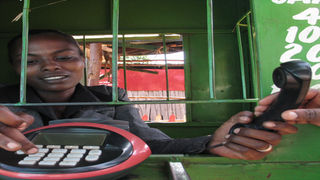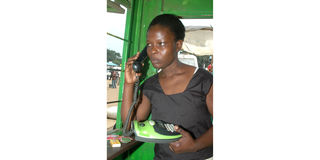
A Simu ya Jamii business in Nyeri.
| Joseph Kanyi | Nation Media GroupHow a ‘corporate miracle’ grew from a city apartment
What you need to know:
- Safaricom grew from an apartment at the Norfolk to Kenya’s top brand.
- It did this through innovative products and services, which add value to its customers’ lives, promote financial and tech inclusion and drive the economy.
Twenty years ago a company was conceived inside a two-bedroom apartment at Norfolk in Nairobi. Five expatriates had arrived to help drive what would place Kenya on the global map of financial technology, and never could they have imagined that their dreams would take the region — and the world — by storm barely a decade later.
Michael Joseph was among the five and has been in the thick of every facet of that company’s hits, misses and struggles in the colourful journey to the top of the corporate pedestal.
The man who now chairs the telco’s Board of Directors calls the tremendous growth of the company a “corporate miracle”, and considers himself immensely favoured to have steered one of the country’s most essential economic drivers.
He had struggled through high school and barely made it to university in South Africa to study engineering. And then he had burned fingers while trying to venture into a tech business in the US in the ’80s, and later missed the chance to lead another mobile telephone firm in Hungary because “he was not polished enough to be a European chief executive officer”.

Michael Joseph.
Not weighed down by his downsides, MJ, as he is popularly known in corporate corridors, counted on his strengths, including a successful start of a mobile telephone firm in Argentina. When he got tipped through a conversation inside a public bus about Vodafone’s plan to start a telco in Kenya, he jumped on it.
“The first two years were not easy at all. I had not known much about Kenya apart from the Maasai Mara, which was one of the places I had yearned to visit. Projections were quite low and we had expected to probably get about 350,000 subscribers in five years. Funding was also a big challenge since our partners, Telkom Kenya, could not borrow and neither could Vodafone commit so much under the uncertainties,” he recalled in an interview.
Earlier on, the pioneers decided to make Safaricom accessible to the ordinary person in the most basic ways, including reduced bureaucracy in acquiring a SIM card, no upfront payments or monthly billings, and free customer care services all the time.
Key driver
The decision is said to have been a key driver in the growth of Safaricom’s close to 36 million customers and the diehard loyalty they have kept, even after competition grew stiff later and the price wars almost triggered a race to the bottom.
Part of the plan to hook in customers was the churning of new product after another, some with resounding successes and others with fast fades — like Simu ya Jamii, which was driven out of business before it took root as mobile handsets became cheaper.
The company now employs slightly more than 5,000 men and women in equal ratio and generates over Sh700 million in revenues daily and pumped Sh654 billion into the Kenyan economy in the year to March 2020. And with that, the significance of Safaricom in the economy remains unmatched by any other company.
Mr Joseph, now the firm’s chairman, says the company is quite conscious of the crucial role it plays, and that a lot of investments have been made to make its network resilient and reduce any fears of freezing the economy.

A Simu ya Jamii business in Kisumu.
“We have invested heavily in system security and resilience, and that investment also explains why we have amassed the market share today. Remember, when we started in October 2000, there was an existing competitor who was six months ahead of us.
“We both used the same technology and started in the same regulatory space. It’s the investments that have distinguished us,” Mr Joseph said.
The investments in the first phases were, however, delayed by lack of funds, leading to the infamous network congestions on Fridays. Callers had sometimes to wait until late night to be connected to the contacts.
A key milestone for the company, however, was M-Pesa, an innovation that has been acclaimed globally due to its transformative sweep at money transfer and business.
MJ says it was a risky gamble whose commercial viability no one could predict or vouch for, and whose financial security few understood.
Microfinance lending
Started as an idea to disburse money for microfinance lending in Thika, the managers at Safaricom would soon notice that many of the users were eager to use the send option in the menu. City dwellers who wanted to send money home to their kin and farm employees were also struggling to do so.
M-Pesa, which had 24.9 million customers by March, has become a key revenue pillar for Safaricom and a business opportunity for thousands of Kenyans.
Together with data services, the platform rolled out in 2007 has now fuelled Safaricom’s evolution from the traditional voice and messaging services due to its deepening relevance in the various sectors of the economy, including agriculture and health.
M-Pesa alone employs more than 173,000 agents and is used by a large number of merchants to process payment, making it a key player in the national payments system. It has become such a reliable mobile wallet that one can confidently leave a physical wallet at home and still live freely, enjoying access to every imaginable product and service.
Revenue stream
From paying utility bills, insurance, borrowing and saving money, acceptability in more than 173,000 outlets in Kenya and 167 countries worldwide has driven the service to be among the top revenue streams for Safaricom. The risky gamble that saw some Sh1 billion pumped into its creation in the first year continues to pay off.
But Safaricom’s growth story has not been smooth all the way. Its listing in 2008 after years of success in the market attracted optimistic investors who scrambled for its shares before the prices tumbled as they watched.
The stock price, which later regained, caused a lot of despair to the buyers who had hoped to share in the Safaricom wealth.
“It was perhaps not the best time to go public; we were just sharing our wealth, but it almost turned out disastrous and very stressful,” MJ recalls. Safaricom is now the largest listed firm on the Nairobi Securities Exchange (NSE), with a market capitalisation of Sh1.207 trillion. It is also Kenya’s most profitable company.
The company has also faced criticism for being dominant in the market, with the competition even being allowed to use its agency networks to run mobile money services. The market share, however, remains largely Safaricom’s and mobile money control by competitors has hardly passed one percent.
It is about time now Safaricom became a technology company.
At the corporate governance level, its first chief executive was diagnosed with cancer three years into the job and went for treatment and survived. Its second chief executive did not.
The death of Bob Collymore was among the heaviest hits on the company at the crust of its success. The current chairman admits that even though Bob was meant to leave the corner office even before he fell ill, his death shook the telco giant.
At 20 years now, the firm is now a ‘grown-up’ and will be expected to step out of the compound comprising data, voice, revenue and M-Pesa, which it has been known for.
“It is about time now Safaricom became a technology company. We are now expected to venture into other areas like education, health and agriculture using the platform we have created over time. We have Peter Ndegwa on the driver’s seat. I believe he is a strong character, a mature player who will move it at the right speed,” says Mr Joseph.



